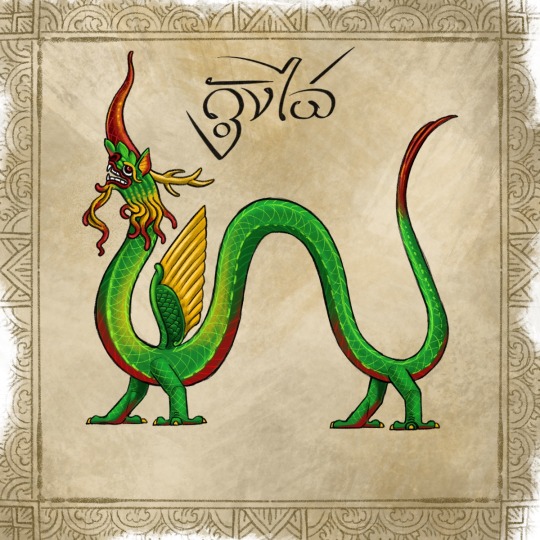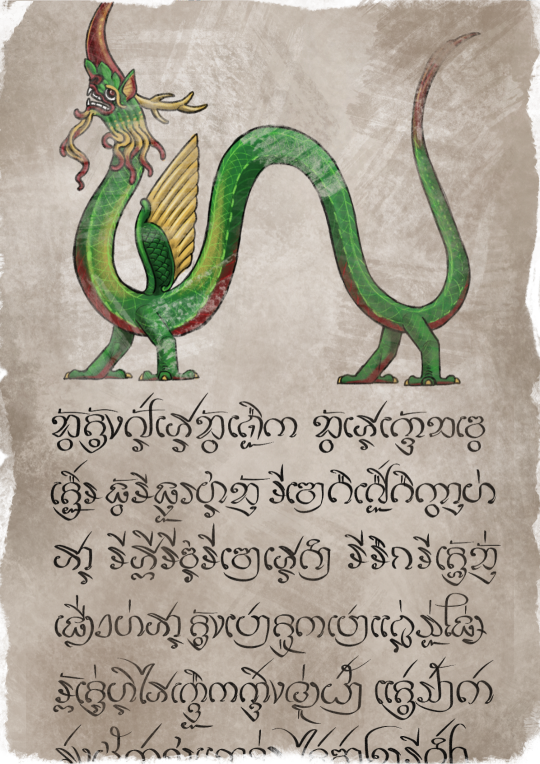My Con-lang and world building stuffs, Mostly the Duan people's language; Pu-duan.
Don't wanna be here? Send us removal request.
Photo


Mythical creature of Puduan
Luang /lua:ŋ/
A snake-like with various characteristic of animals; eyes and wings of a hawk, body, scales and fangs of a snake, legs and claws of a lizard, head of a horse, red crest of Naga, antler of a deer.
Luangtai /lua:ŋ tʰaj/
Luangtai is the lord of Luangs, appeared in several Puduanese scriptures, folktales and mythologies. He is one of many children of Taentai /tʰɛn tʰaj/ ruler of heaven. Luangtai can cause rain and storm; when he is happy he will fly to the clouds and flying around in a playful manner. This behavior will cause rain, but if he is angry he will fly around and roar; causing thunderstorm.
Scripture describing Luang
Script: Duan, Late-Aran Language: Puduan
“...Luang have body of serpent with green reflective scale, crest above their nose, horns like deer, teeth and fangs (with color) like couch shell, golden wings and horns, 4 hands (legs) like that’s of hawk. Luangjau (Luangtai) children of Jaotaen (Taentai) likes to play among clouds up in the sky. Then there will be rain on the earth making rice grow and fish in water...”
10 notes
·
View notes
Photo


Poetry of Duan
People of Duan like to write in poem. They have various types of rhyming system use in specific circumstances, mostly religious. This paper inscribed a song or a hym of worship of the Earth Goddess; Jaula /tɕau la:/ | came from Jau (n. great person, lord-lady, leader, master) + La (n. earth) transliterate as ‘Lady of the earth’
Dr. Adhiraj Singh has found several parts of a ceremonial poems scripture of Duanese during his expedition to the ruin site dk115-4 in 1997. He named it Jauya’s hymn. Researchers still haven’t found the writer and the year they were written.
Script: Duan, Late-Aran Language: Puduan
The Inscription and translation: O, Jauya—muqa yoe yok hwai Oh!, grand mother, we worship.
Mutai nuea dtaue—ma bpa ma ruam All of us, from north and south have come here together.
Pa-hmaue saue suam—hom kaw gliang-glau Wearing new clothes in clear white.
Ma murau—ma si hwai jaula Come! everyone. Come worship Jaula
Yok kaw yok bpla—kuen dtang soey stang bon Holding rice and fish (food) and put them on an altar above.
Yok kaw yok kon—yoe nuea qon kuen ngay Holding rice and pelt by the 'person who wakes in the morning'
Roeng kan muea-sai—foen luat-lay rai-ram We sing at mid-morning, dancing.
Hying-hyai haue nam—pa ma hom ma hoe The lady tell us to cover (the statue) with fabric.
Sek nam-duan saue—wai ab jauya Making Duan water and shower Jauya with them.
Bpa prom hom pa—haue gliang haue hoem Springling the water on your head make them fragrance.
Bpa bpaeng dtang dtoem—bpen daw bpen duang Put on powder (on the statue face) in the shape of stars and circles.
Haue ya nang luang—tong taen tong daw Make her (the goddess) ride on Luang (Dragon) and rule heaven and earth.
21 notes
·
View notes
Photo


Kun kamjaeng’s record on black papers
Script: Duan, late-Aran (Conscript) Language: Phuduan (Conlang) Translation: "Wednesday 13th of July, Year of the cow. I, Kun kamjaeng ordered the court to put on an offering gathering altar. There were a mother cow, a mother canine, a hen, food; rice, and fish, desserts; snacks of 13 types. I ordered the court artisans to make a big silver tree and a big golden tree, to make beautiful puppets; girls, boys, women, and men in the size of half a waist of a young man. They were dressing in new clothes and be put to the altar. Me and my family, the courtiers, the royal medics and their servants, the shaman and her servants decorated the parade in flowers and fruits. In the front, there were musicians masters of Khaens, Flutes, and drums followed by dancers, the shaman, the medics, the courtiers, and my family which we were siting on palanquins lifted up by our servants. In the back, there were the army and their general as well as the left and the right (of the parade). My procession reached the ghost mountain. The mother shaman were guiding us by singing a song of worship with her disciples. Then the masters performed. Me and my people hold the offerings; meat, liquor, Bai-si on high to Ya Phi. The court master gave beautifully dressed 13 servant puppets to her and put them at various place around her palace; 2 big one guarding the front entrance on the south, 4 guarding the door to her chamber. 8 around her to carrying her command. I made them changed her old clothing to a new one. The mother shaman created the Duan water and shower her (Ya phi), and put fragrant powders and flower perfumes on her (Ya phi). The left water were shared among me, my family, courtiers, shaman, her people. and everyone to brought home"
6 notes
·
View notes
Photo

Ya Bayan’s worship song
Script: Duan, Late-Aran (Conscript) Language: Isan-Thai Translation: Sadhu ! hold our hands above our heads. Worship the lady grandmother. Put our hands to our hairs. A sacred bowl, Incense stick and candles in two, We all worship Ya Bayan. Ya Bayan, your grace was ancient. Your favors were many. Us women, and men bring offerings to you. There're many food. There are many meals and desserts. And many other things from many villagers. They come here to repay your favors. Your grace is only goodness. Decease will flee. There will be no sickness. The lady grandmother will always help. When the 6th month (May) arrived. The rains come. There will be crabs and fish in pounds and swamps, Water is presence, Rice farmers rejoice, And many other things from Ya Bayan. Ya Bayan will always taking care; make us free from sickness. All good from good deeds will follow. We bid you good bye. We repay your favors and say goodbye. Lady grandmother. Lady Ya Bayan, we must say goodbye.
#conlang#constructed language#conscript#constructed script#world building#literature#literacy#poem#poetry
4 notes
·
View notes